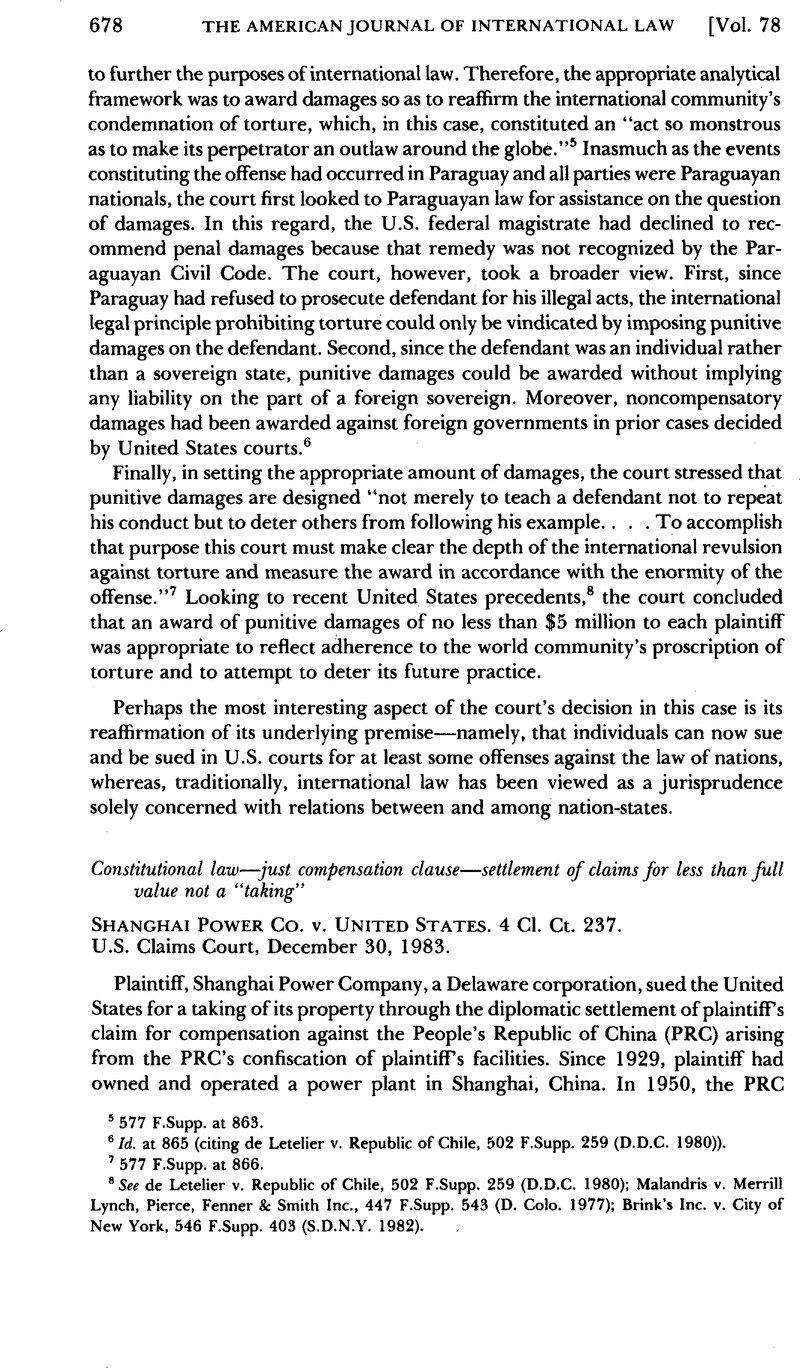Article contents
Shanghai Power Co. v. United States. 4 Cl. Ct. 237
Published online by Cambridge University Press: 23 March 2017
Abstract

- Type
- Judicial Decisions
- Information
- Copyright
- Copyright © American Society of International Law 1984
References
1 The Fifth Amendment provides in pertinent part: “[N]or shall private property be taken for public use, without just compensation.” U.S. Const, amend. V.
2 On Feb. 28, 1984, the Shanghai Power Company noticed an appeal of this decision. Oral arguments before the U.S. Court of Appeals for the Federal Circuit are not anticipated before fall of 1984.
3 4 CI. Ct. 237, 240.
4 Id. (quoting Note from U.S. Secretary of State Hull to the Mexican Ambassador, Apr. 3, 1940, reprinted in 3 G. Hackworth, Digest of International Law 662 (1942)).
5 4 CI. Ct. at 241. The court expressly rejected the argument that plaintiffs claim was not “property” because the PRC might have defeated a district court’s jurisdiction over the claim by invoking the Foreign Sovereign Immunities Act of 1976, 28 U.S.C §§1330, 1602-1611 (1982) (FSIA). The FSIA merely determines whether a U.S. forum exists for the presentation of claims against a foreign government; it has no bearing on the substantive law of liability. Thus, the existence of jurisdiction under the FSIA was irrelevant to the question whether plaintiff’s claim constituted “property.”
6 4 CI. Ct. at 241.
7 While assuming for the purposes of this decision that plaintiffs claim was worth more than the amount of the settlement, the court rejected plaintiffs contention that the Commission’s assessment of the claim was its proper value. The Commission had based its valuation upon the ex parte presentation of evidence by the plaintiff concerning the physical value of the power plant. In the court’s view, the value of the claim settled by the President was entirely different and depended upon such factors as plaintiff’s ability to locate a forum where the claim could be brought, overcome any defenses asserted by the PRC, and execute any judgment obtained against the PRC, as well as the expense of prosecuting the claim.
8 If hostile relations between nations are not repaired, the court reasoned, claimants might never receive any compensation for their properties. Thus, plaintiff’s contention that the President had sacrificed its claim “could well be stood on its head”; rather than an unexpected loss, the settlement could be characterized as a “windfall gain.” 4 CI. Ct. at 245.
9 Id. at 246 (quoting Penn Cent. Transp. Co. v. New York City, 438 U.S. 104, 124 (1978)).
10 4 CI. Ct. at 246.
11 See, e.g., Gray v. United States, 21 Ct. CI. 340, 393 (1886); Meade v. United States, 2 Ct. CI. 224, 275 (1866), aff’d on other grounds, 76 U.S. (9 Wall.) 691 (1869); Seery v. United States, 127 F. Supp. 601, 606 (Ct. CI. 1955), cert, denied, 359 U.S. 943 (1959).
12 See, e.g., Great Western Ins. Co. v. United States, 19 CI. Ct. 206, 217-18, aff’d on other grounds, 112 U.S. 193 (1884).
13 See Restatement (Second) of the Foreign Relations Law of the United States 213 (1962). In the United States, this trend culminated in the enactment of the FSIA.
14Seery v. United States, 127 F. Supp. 601 (Ct. CI. 1955), cert, denied, 359 U.S. 943 (1959). But see Aris Gloves, Inc. v. United States, 420 F.2d 1386 (Ct. CI. 1970). As early as 1866, the Court of Claims recognized that the cancellation of a U.S. national’s claim against a foreign nation was a taking requiring just compensation under the Fifth Amendment. Gray v. United States, 2i Ct. CI. 340 (1886); Meade v. United States, 2 Ct. CI. 224 (1866), aff’d on other grounds, 76 U.S. (9 Wall.) 691 (1869). Dictum in another recent decision indicates that the views of the Shanghai court are not shared by the entire Claims Court bench. In E-Systems, Inc. v. United States, 2 CI. Ct. 271 (1983), the court held that while restrictions placed on plaintiffs security interest in assets of the Islamic Republic of Iran may have resulted in a taking under the Fifth Amendment, plaintiff’s complaint seeking compensation was premature because plaintiff had not exhausted its remedies before the Iran-U.S. Claims Tribunal. Rather than dismissing the complaint, however, the court suspended further judicial proceedings pending final disposition of plaintiffs claim before the Tribunal. The court stated that “[t]here may well be situations when the President’s extinction or ‘settlement’ of a claim against a foreign government, without the consent of the claimant, would constitute a ‘taking’ of private property for public ‘use.’ “ Id. at 281. Furthermore, the court declared, “[t]here is no more persuasive reason why this should not apply in achieving a national purpose or benefit in the field of foreign policy than in the accomplishment of any other lawful national purpose or benefit.” Id. at 275.
15 Dames & Moore v. Regan, 453 U.S. 654, 691 (1981) (Powell, J., concurring in part and dissenting in part). Justice Rehnquist, writing for the majority, also acknowledged “the possibility that the President’s actions may effect a taking of petitioner’s property.” Id. at 689.
- 1
- Cited by




